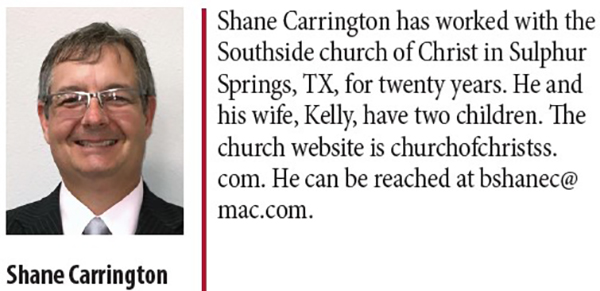by Shane Carrington
Synopsis: Scripture declares that the Holy Spirit indwells disciples through the word. Some object to this statement, so let’s consider some of those objections.
Some shortchange God’s word, but God said, “Let there be light,” and it was so (Gen. 1). Peter adds, “by the word of God the heavens existed long ago and the earth was formed” (2 Pet. 3:5). His powerful word created worlds! And sustains them: “by His word the present heavens and earth are being reserved. . . kept. . .” (2 Pet. 3:7). Such power defies imagination! God’s written word reveals His holiness and sanctifying power (John 17:17), connecting us to God through Jesus. He said, “These have been written so that you may believe. . . that by believing you may have life. . .” (John 20:31). Paul echoes, “The gospel. . . is the power of God for salvation. . .” (Rom. 1:16).
Yet, it seems to me that some shortchange the power of God’s written word. Through “the word of His grace,” God employs the power embedded in the gospel “to build you up and to give you the inheritance among all those who are sanctified” (Acts 20:32). It is the surgeon’s scalpel and the warrior’s sword refining us to serve God. “For the word of God is living and active, and sharper than any two-edged sword, even penetrating as far as the division of soul and spirit. . . able to judge the thoughts and intentions of the heart” (Heb. 4:11-12). Some discount that power, saying they need more, turning to a mystical view of the Holy Spirit’s work—seeking a tangible concept of the Spirit’s indwelling.
Francis Chan, a popular American preacher, and Calvinist, often says things that sound non-Calvinistic (such as his video on baptism). Occasionally, Chan argues less like a five-point, classical Calvinist and more like a neo-Calvinist (cf. Neo-Calvinism in the Church of Christ, by Tom Roberts, Truth Publications, Inc.). Consider some unbiblical things Chan has written about the Holy Spirit’s work:
The Spirit mystically inhabits the bodies of Christians: “. . . Jesus merely walked beside the disciples; the Spirit would actually enter their human bodies (John 14:17)” (Chan, 110).
The Spirit mystically empowers Christians apart from the word: “Empowering His children with the strength of the Holy Spirit is something the Father wants to do. . . He genuinely wants to see us walk in His strength.” He then quotes Luke 11:13 (Chan, 50-51). “The Holy Spirit is the one who fills believers with God’s love and the one who enables us to love one another” (Chan, 95). He quotes Ephesians 3:16-19 as proof.
He appeals to emotionalism: “Thinking, questioning, and talking can take the place of letting the Spirit affect our immediate actions in radical ways. . . stake everything on His power and presence. . .” (Chan, 121). “I have experienced God the Holy Spirit working in and through and around my life in ways I cannot deny or ignore. I certainly do not advocate ignoring the Scriptures or basing everything on experience, but to completely ignore experience. . . is unbiblical” (Chan, 151).
He blends inspiration passages with non-miraculous passages, and he believes we are disabled to make godly decisions: “Ask the Holy Spirit to enable you to set everything else aside right now so that you can seek Him wholeheartedly” (Chan, 114).
Misguided teachers, thinking the Holy Spirit mystically inhabits their bodies, will give equal or higher credence to that mystical leading because they will confuse emotion with revelation. What a dangerous stance!
We must use discernment rather than blindly imbibing non-inspired writings. Just because something is written in a book or proclaimed on a podcast does not make it biblically accurate or gospel truth. Weigh everything by God’s word: “examine everything; hold firmly to that which is good, abstain from every form of evil” (1 Thess. 5:21-22).
Chan advocates a mystical indwelling of the Holy Spirit in our bodies, empowering our decision-making. While believing the written word is essential, he believes we can neither understand nor follow it without an apart-from-the-word indwelling. He is a popular representative of a popular view. Sadly, many brethren have been influenced by this thinking.
Since Chan is a Calvinist, you can see why he would write these statements. When a teacher’s theology is misguided, the conclusions drawn will often lead away from God’s word. Never recklessly repeat what Calvinists say.
“What about the Indwelling of the Holy Spirit?” Scripture consistently teaches that the Spirit indwells us through the written word (see Luke 16:29-32; John 6:44-45; 16:7-15; 20:30-31; Eph. 3:3-5; 6:17; 1 Thess. 2:12-13; 2 Tim. 3:16-17; etc.). Consider some objections to this statement.
“The Bible Clearly Says the Holy Spirit Indwells Christians.” Absolutely. In many passages (1 Cor. 3:16-17; 6:19-20; Eph. 3:14-21; etc.)! However, the real question is: through what means? Ephesians 6:17 declares, “the sword of the Spirit, which is the word of God.” So the instrument the Spirit uses to change hearts and lives is the word of God. Other writers in this issue will elaborate.
“You Are Saying That’s Just the Bible in Me.” Growing up on a farm, my Daddy entrusted me with many responsibilities. When I did his bidding, Daddy was working through me—his spirit indwelling me. His instructions were no cold, lifeless manifestos. His heart was in everything he said, and my faithful participation meant I was a loving, obedient, trusting, valued part of Daddy’s will being accomplished on the farm.
In most contexts, we understand this, but some struggle regarding the written word, treating Scripture like an ancient, dead letter rather than God’s powerful, living word. Is Scripture comparable to an itemized list of things you are grudgingly sent to purchase at the grocery store: beets, liver, anchovies, etc.? Hardly! Scripture reveals the heart and will of God!
God’s word “is living and active, and sharper than any two-edged sword, even penetrating as far as the division of soul and spirit. . .” (Heb. 4:12). The God-breathed, written word thoroughly equips us “for every good work” (2 Tim. 3:16-17). Psalm 119, the longest chapter in the Bible, describes Scripture’s vital roles. Demeaning God’s written word as “that’s just the Bible in me” demeans the God whose word it is, just as demeaning the instruction of my Daddy on that farm would have demeaned him.
For three years, my beautiful wife, Kelly, has battled cancer. During that time, wonderful people have sent encouraging messages. Among those sending multiple cards are Wanda Elliott and Jim and Sue Tillet. We receive each for what it is: earnest, loving communication from people revealing their heart’s desire for Kelly and me. We never demean those cards as, “that’s just a card in me.” Neither should we concerning the written word of God. “Lord. . . You have words of eternal life” (John 6:68-69). Those words are in the Holy Spirit inspired, written word!
“You Are Limiting the Power of God the Holy Spirit.” While the universe stands, our omnipotent God always limits the use of His power. Otherwise, all physical things would disappear!
God, through His sovereignty, created us in His image, enduing us with freedom of choice. That does not deny His power.
God powerfully created us capable of understanding His instructions. Adam and Eve were instructed, expected to honor God by obedience, and were accountable when they disobeyed. We fit the same criteria.
God used His sovereign power to reveal the written word in a way that we can understand and obey: “Walk in a manner worthy of the God who calls you. . . when you received the word of God which you heard from us, you accepted it not as the word of mere men, but as what it really is, the word of God, which also is at work in you who believe” (1 Thess. 2:11-13).
God knows how to lead us, and He chose the Holy Spirit—through the written word (John 16:7-13; 20:30-31; 2 Tim. 3:16-17; Eph. 6:17)—to guide us.
“We Can’t Be Strong Without a Mystical Indwelling Energizing Us.” This summarizes Chan’s sentiment. Similarly, others say, “We are too disabled spiritually to understand the Bible or resist sin without the Holy Spirit mystically indwelling us.” Shades of Calvinism drive this, believing some “sinful nature” cripples us from true faith and love. Every passage referenced above denies this, and also Philippians 2:12-16.
“We Receive ‘the Gift of the Holy Spirit’ When Baptized (Acts 2:38).” Others will elaborate, but “the gift of. . .” grammatically, could mean either the Holy Spirit is the Gift received—or the gift Giver. That should slow the fervor of insisting He is the Gift received. Secondly, the miraculous element in this passage might imply the “gift” refers to temporary, miraculous gifts some early disciples possessed. Finally, the passage’s primary point is “that everyone who calls on the name of the Lord will be saved” (Acts 2:21). That would tend toward “the gift of the Holy Spirit,” referring to New Covenant blessings through Christ concerning which the Holy Spirit prophesied. That is my conviction.
Thoughtful Bible students have drawn differing conclusions about this phrase, but let’s not be quick to go from, “It could mean this” to “therefore I believe. . .” and “I’ve witnessed. . .” thus hastily making applications that might not be biblical.
The Spirit revealed the word (John 16:13), even in written form (John 20:30-31; Eph. 3:3-5). Scripture reveals everything God declares so we can be “fully capable, equipped for every good work” (2 Tim. 3:16-17). Through means of this word, the Holy Spirit indwells us, growing us into the image of Christ.
We can’t afford to think out loud in working through controversial Bible subjects in public forums like Facebook. We certainly can’t afford this in the pulpit! Preach Biblically-rooted convictions, not doubts. Repackaging error to sound fresh and exciting may draw numbers, but playing on people’s uncertainties erodes confidence in Scripture.
May we be filled with the Spirit (Eph. 5:18-19) through letting the word of Christ richly dwell within us (Col. 3:16). Never trade the Spirit’s revelation for the mystical and unbiblical.
Chan, Francis. Forgotten God: Reversing Our Tragic Neglect of the Holy Spirit. Colorado Springs, CO: David C. Cook, 2009.


